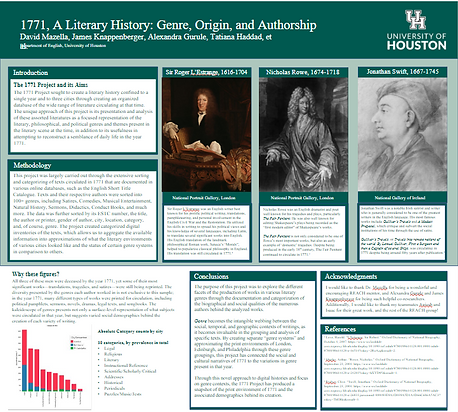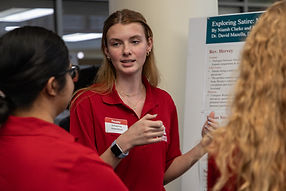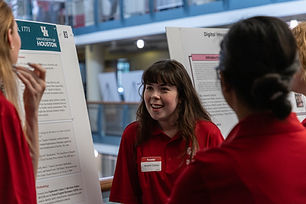
Past and Continued Work
Here you will find what has been completed, work that is currently in progress, as well as the communities and organizations who supported the work of Dr. David Mazella and his research assistants.
01
CITE

CITE (Cougar Initiative to Engage) funded the 1771 project in 2022. This was where research assistants were hired to gather data of authors from multiple genres (Novelists, Poets, Musicians, Satire, Essayists, etc.) regarding their date of birth, date of death, their father's occupation, education, occupation, and publications they had throughout their life. With the information they found, research assistants were tasked to analyze the data and write summaries for each genre.
The group continued the work in Summer of 2023 and contributed definitions to the 1771 glossary terms. The glossary terms are there to help familiarize audiences technical terms used often in the project. Along with the glossary terms, research assistants were given visuals that showed the amount of genres printed in a printing city and tasked to write observations and patterns they noticed in their summaries.
02
REACH + SGP
The 1771 team recruited new members thanks to the REACH program (Research for Aspiring Coogs in the Humanities) and to join the existing team thanks to the SGP grant to move on to the next stage of the project, which is to clean a set of British novels. Since most of the novels have a number amount of errors in spelling. Since at this stage the project is focusing on analyzing the word frequencies using Voyant. So in order to get an accurate reading from Voyant, it is important to get the novels clean and ready to be analyzed.




03
2024 Summer Internship of Public History and Digital Humanities
Currently as of the summer of 2024, the 1771 team joined the SIPHDH internship along with five other projects to not only help projects progress forward in their research but to also give their research assistants new skills to add onto their resume. The internship also focuses on combining the two disciplines, Humanities and STEM, into creating an interdisciplinary project.
During the ten week internship, the team learned about optical character recognition (OCR). OCR is a crucial part of the project because it converts picture into plain text. That way, the team is able to clean text appropriate for word frequency analysis.
While the team was cleaning novels, they were also creating deliverables for the project. Team A was in charge of creating a slide deck to help orient oncoming research assistants to help deliver information quickly.
Team B was in charge of creating a website prototype to visualize the 1771 team's findings into a web format. The purpose of the website is to earn the GEAR grant to continue funding for the research, and to also understand what is important to share with a public audience.


04
Future Research
After the internship, the team will continue cleaning the novels and analyzing word frequencies of the novels. The purpose of cleaning novels where punctuation, headings, and all words to be lowercased is to have the novel go through a word frequency processor, like Voyant, to help the team identify patterns and trends in novels studied by the 1771 team.


05
Acknowledgements
Thank you to UH Libraries, UH SGP, CITE, REACH, DRC, DHCF, and now SIPHDH for their support!
We also appreciate the assistance with visualizations and site construction provided by Keith Komos, Rohit Kumar, and others over the years.
This phase of the project would not have been possible without the work and consultation of the first 1771 Team: Dr. Claude Willan (Durham); Elizabeth Stravoski, Walter Barta, David Bishop, Max James. We gratefully acknowledge their contribution.
SIPHDH INTERNS
Anisah Khan
Reece Simmons
Haian Hoang
ENGLISH INTERNS
Niamh Clarke
Louisa de Paula
Jules Hamilton
Lauryn White
SIPHDH Coordinators
Dr. Kristina Neumann
Ms. Miranda Ruzinsky
DHCF Falculty
Dr. Linda Garcia Merchant
Jun Kim
For more information, contact Dr. David Mazella, UH Department of English at mazella@central.uh.edu
